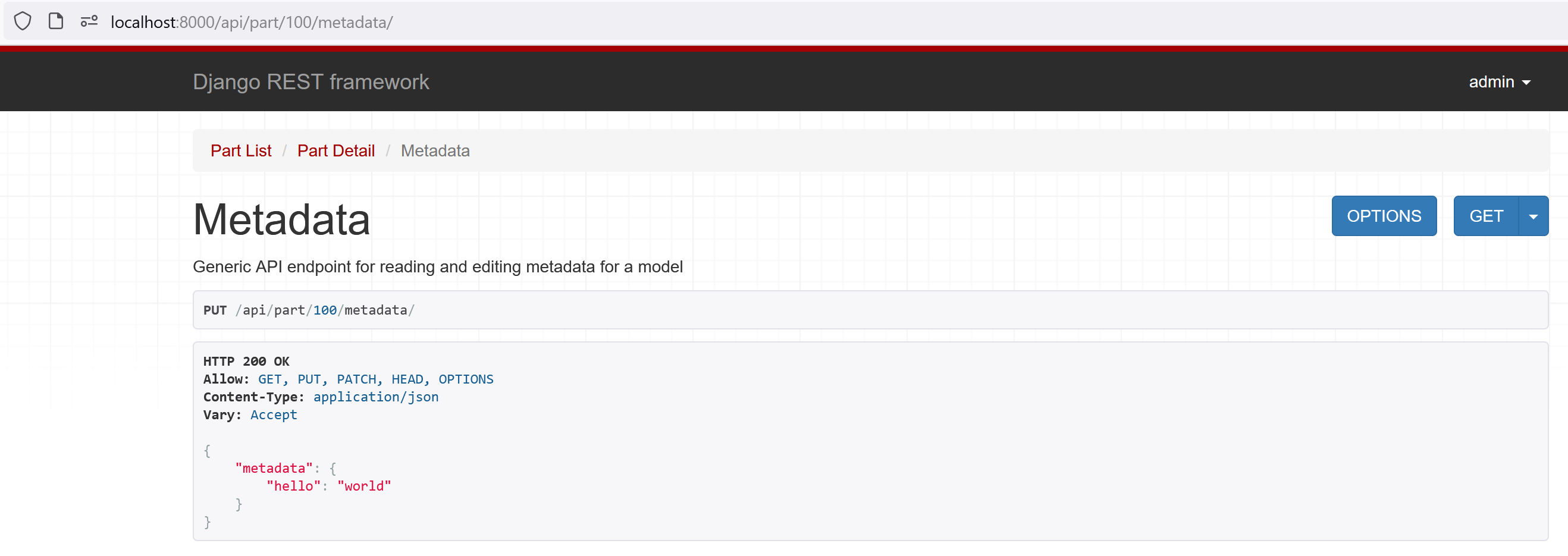Model Metadata
Model Metadata¶
Plugins have access to internal database models (such at Parts), and any associated data associated with these models. It may be the case that a particular plugin needs to store some extra information about a particular model instance, to be able to perform custom functionality.
One way of achieving this would be to create an entirely new database model to keep track of this information, using the app plugin mixin. However, this is a very heavy-handed (and complicated) approach!
A much simpler and more accessible method of recording custom information against a given model instance is provided "out of the box" - using Model Metadata.
MetadataMixin Class¶
Most of the models in the InvenTree database inherit from the MetadataMixin class, which adds the metadata field to each inheriting model. The metadata field is a JSONField which allows for storing arbitrary JSON data against the model instance.
This field is provided to allow any plugins to store and retrieve arbitrary data against any item in the database.
External Use Only
It is important to note that the metadata field of each model instance is not used for any internal functionality. Any data stored against this field is only for use by external plugins.
Accessing Metadata¶
Plugin Access¶
The metadata field can be accessed and updated directly from custom plugin code, as follows:
from part.models import Part
# Show metadata value against a particular Part instance
part = Part.objects.get(pk=100)
print(part.metadata)
> {'foo': 'bar'}
part.metadata['hello'] = 'world'
print(part.metadata)
> {'foo': 'bar', 'hello': 'world'}
API Access¶
For models which provide this metadata field, access is also provided via the API. Append /metadata/ to the detail endpoint for a particular model instance to access.
For example:


PUT vs PATCH¶
An important note with regard to metadata access via the API is the behaviour of a PUT request vs a PATCH request. As demonstrated in the comparison below, a PUT request will overwrite existing data, while a PATCH request will merge with existing data.
Initial Data:
{"foo": "bar", "hello": "world"}
Payload:
{"xyz": "XYZ"}
Result of PUT request:
{"xyz: XYZ"}
Result of PATCH request:
{"foo": "bar", "hello": "world", "xyz": "XYZ"}
Take Care
Take care when updating metadata via the API, especially when using a PUT request.
Python API Access¶
The Python API library provides similar support for accessing model metadata. Use the setMetadata method to retrieve metadata information from the server:
from inventree.api import InvenTreeAPI
from inventree.part import Part
api = InvenTreeAPI("http://localhost:8000", username="admin", password="inventree")
part = Part(api, pk=100)
print(part.getMetadata())
> {'foo': 'bar', 'hello': 'world'}
Metadata can be added directly here using the setMetadata method:
part.setMetadata("abc", "xyz")
print(part.getMetadata())
> {'abc': 'xyz', 'foo': 'bar', 'hello': 'world'}
Merge vs Overwrite
By default setting a metadata key:value pair will merge data in with existing data, by using a PATCH request.
To overwrite existing metadata, use the overwrite=True flag:
part.setMetadata({"aaa": "ABC"}, overwrite=True)
print(part.getMetadata())
> {'aaa': 'ABC'}
Considerations¶
Data Keys¶
There is no guarantee that the data added to a particular model will not be overwritten by a different plugin. Your plugin should at least ensure that the data keys used are unique to the plugin, to ensure that they do not conflict with other plugins
Structured Data¶
If you need to store data which is more "structured" than JSON objects, consider using the (more complex) app mixin to develop custom database tables for your data.